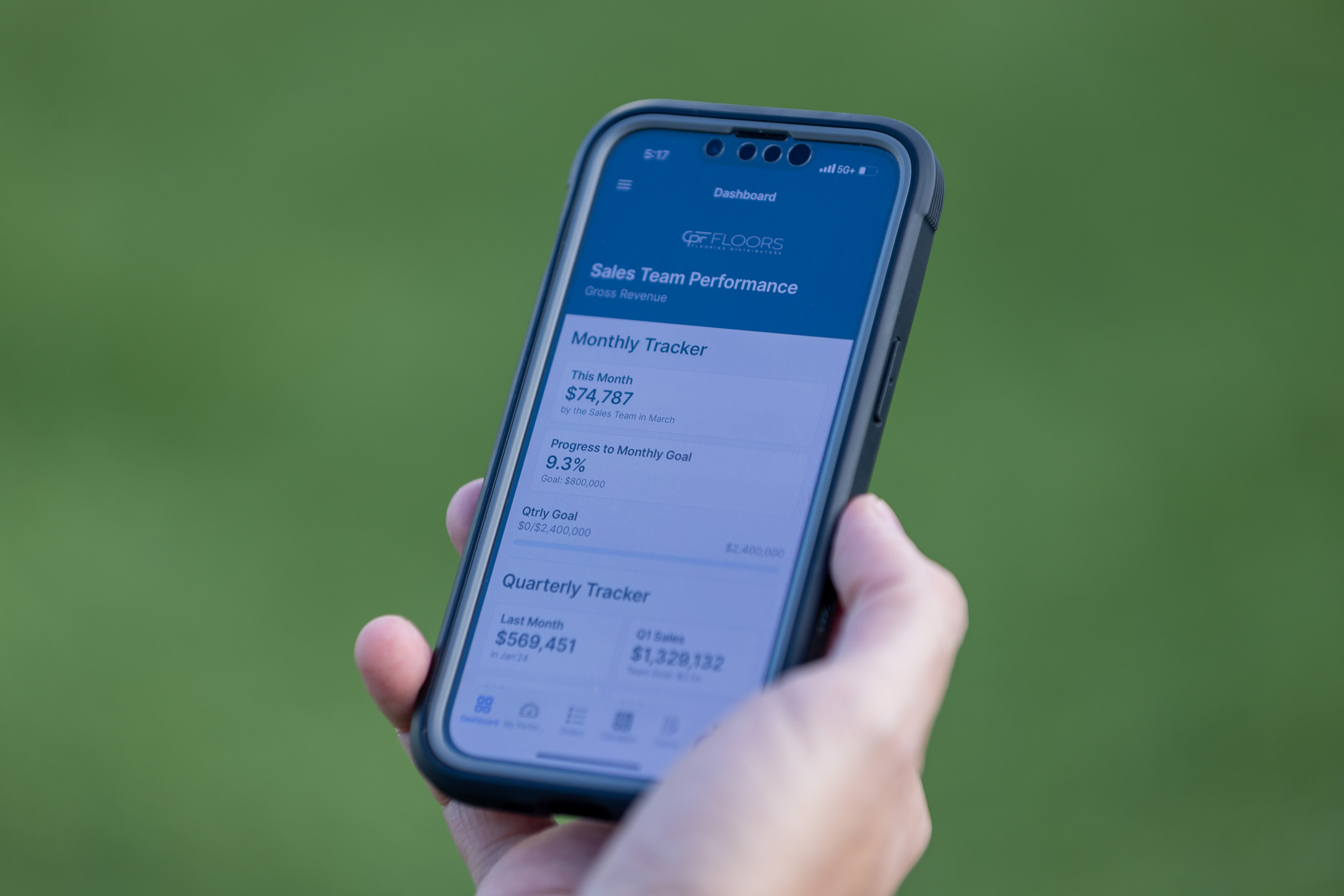Sales teams create the most value when they're connecting with prospects and closing deals.
But too much of their day gets eaten up with research, note-taking, and CRM updates instead of actual selling. Meanwhile, managers can't see what's really happening with deals in progress or how their field teams are doing.
Some businesses have attempted to solve these challenges by implementing basic chatbots for quick sales automation. This approach, however, barely scratches the surface of what's possible when you bring artificial intelligence into the sales process. The real benefit comes from integrating agentic AI systems that handle the labor-intensive tasks that slow sales reps down, providing deeper insights into prospect needs and behaviors. When your team spends less time on manual data entry and research, they can respond to customers faster, close more deals, and drive more revenue.
"Sales is the only profession where you can give yourself a raise any day," says Katie Harkins, VP of Sales at Glide. "Using AI in sales empowers your team to use their time wisely, make smarter decisions in your sales cycle and over-achieve on your quota. After all, time is the only asset you don't own."
This guide looks at the impact of AI for sales teams and how it helps you cut out time-consuming tasks and keep your pipeline moving, giving your team more time to sell—and win.
1. Improves lead generation and qualification
AI cuts down the time it takes sales teams to find and qualify leads, sifting through mountains of data across digital platforms to identify potential customers who match your ideal profile.
Many sales teams still rely on manual research and cold calls—where success rates average just 4.8%—to find potential customers. That’s a lot of time spent finding leads to call or email, trying to get a response, and finally having the conversation, with very little success to show for it. AI automates the process so sales reps no longer need to spend countless hours on market research. They can, instead, spend their time having conversations with qualified prospects.
"AI is transforming how we handle lead qualification at Glide. Instead of me spending 20+ hours a week sifting through thousands of leads—a full-time job on its own—AI analyzes, qualifies, and summarizes them into confidence levels: low, medium, and high. It formats everything into an easy-to-read report with contact info and company background, saving me at least 15 hours per week. Now, I only need to audit the high-confidence leads and craft a personalized message. This has been an absolute game-changer for me." – Cameron Barrett, Senior Account Executive at Glide
Because agentic AI learns from past interactions and outcomes, it gets better at identifying promising leads who not only need your product or service but also have the budget to purchase it.
Businesses that are using AI for lead generation efforts are seeing real results. According to McKinsey, 60% of commercial leaders say AI has had a significant impact in how they find and identify leads.
2. Save time on research before sales calls
Pre-call prep that once took 20 minutes now takes a fraction of the time, with AI pulling key prospect details from multiple sources and generating a comprehensive brief for reps to scan.
Your sales team arrives at work facing a day of calls, and without AI, each conversation requires manually scanning LinkedIn profiles, reviewing company websites, digging through past interactions, hunting down CRM records, and compiling a profile.
AI eliminates this labor-intensive task by automatically creating complete customer profiles and delivering instant prospect summaries to sales reps. For customers already in your pipeline, AI also surfaces valuable insights from previous sales calls, including conversation details and next steps. Sales reps walk into every call knowing exactly where they left off and where to take the discussion next.
This automated information-gathering system helps sales professionals pack more conversations into their day, turning several hours previously lost to research into more opportunities to close deals.

3. Empower field sales teams with instant access to tools and data
AI-powered mobile sales tools put the full power of your sales stack into your field reps' hands. An AI sales agent lets field teams close deals with professional-looking custom tools that showcase your product photos, technical specifications, and real-time inventory data with authority. They can even access customer histories on the go, making the process of up-selling and cross-selling easier. Field reps no longer need to call the office for basic information and delay purchasing decisions.
“Our sales reps can use the app for algorithmic calculations and know the price that the customer will be paying instantly. It provides you with this proud moment. You can sit at a table with a customer and provide solutions at a glance. Especially if you are in a sales-led organization, your customers want to see that you are the real deal. Our app has helped us unlock value, look solid in every customer experience, and make our team more nimble, more agile, empowering people to do what they need to do. It’s bringing everyone into their zone of genius. For a company like us, that's priceless.” – Javier Aguilera, Director of Commercial Operations at CPF Floors
While mobile apps help field reps update customer notes from anywhere, adding AI-powered voice-to-text transcription makes the process easier and faster. Field reps can add voice notes to the app, and the AI technology will summarize it, structure it, and add it to the customer’s information in the CRM.
“This single AI workflow makes a massive difference for [field reps] day-to-day. All of these things that would take them time and brain power, that they shouldn't have to think about. Their job is not to think about their comments. It’s to think about what's happening on the site.” – Bill Schonbrun, COO and Co-Founder of CarboNet
Mobile AI sales tools also help managers, who can see field activities, reps’ locations, and completed tasks in real time. The AI agent replaces scattered updates and sporadic check-ins with the full picture. Sales reps stay productive wherever they work, creating better customer experiences through faster responses and shorter sales cycles.
4. Provide instant access to product information
Sales reps can use AI to get immediate answers to unexpected customer questions, eliminating those momentum-killing "let me get back to you" moments during sales calls.
Even the best prepared sales rep might face a customer question they don’t have an answer for off the top of their head. Sales reps can simply ask an AI agent questions using natural language, just as they would ask a colleague, and receive clear, accurate answers they can share with customers right away. Within seconds, AI pulls the relevant information from multiple sources you connect, such as product brochures, internal knowledge bases, technical documentation, and sales enablement materials.
This instant access to accurate product information keeps conversations flowing smoothly, building customer confidence when salespeople can answer unexpected questions without missing a beat.

5. Document and preserve sales conversations
AI tools capture, store, and analyze every detail of customer interactions, freeing sales reps to focus entirely on building relationships instead of taking notes.
Those casual mentions of budget constraints, specific product preferences, and technical requirements? An AI sales tool creates instant transcripts and meeting summaries so information is never overlooked or lost. It can even analyze sentiment so your team knows what steps to take next to resolve any issues and keep the customer happy. Sales reps can focus on the conversation without scrambling to jot down notes or straining to remember key points.
This automated documentation means there’s no risk of your sales team missing critical information that could impact closing deals. Instead of relying on memory or deciphering handwritten notes, sales reps receive clear, digestible summaries of their calls, with important points automatically highlighted for quick reference. AI also picks up on patterns across multiple sales calls, giving your team insights that make it easier to close deals.
6. Keep CRM data up to date
AI-powered sales tools remove the frustration of outdated, incomplete, or duplicated CRM records, automatically syncing customer data with interaction history, call recordings, transcripts, external research, and sales rep notes to create a complete view of each contact and business.
Traditional CRM platforms like Salesforce and HubSpot can be clunky, and while some users adopt them well, others struggle with keeping them updated. An AI sales agent can solve this by combining all captured data and notes into a complete customer view. Sales reps simply speak or type their updates into their mobile apps while AI extracts key details, organizes the information, and syncs it directly into the CRM. It does the same for recorded sales calls, turning them into structured data entries.
This means no more outdated records or information trapped in digital silos. With fresh, accurate customer data always within reach, sales teams spend less time hunting for or updating information and more time closing deals with a deep understanding of their customers' needs.
7. Filter out casual browsers from serious buyers
Chatbots aren’t a complete AI or sales automation solution on their own, but, when used well, they play a valuable role in filtering out unqualified leads. They handle the time-consuming work of screening website visitors, giving your sales teams a steady stream of qualified leads who are ready to talk business.
An AI-powered chatbot separates those who are still weighing their options from serious buyers, connecting motivated leads directly with your sales team while guiding early-stage visitors to helpful resources. The result is a more focused sales process where your team spends time closing deals instead of trying to figure out if the prospect is ready to buy or simply a casual visitor.
8. Generate automated quotes and proposals
Generative AI turns hours of post-call proposal writing into minutes, creating personalized quotes and detailed documents directly from sales reps’ notes and conversation transcripts.
Instead of going back and forth on pricing, sales reps can generate accurate quotes instantly by entering key details from their conversations into an AI sales agent. It calculates real-time pricing based on the input and conversation highlights, generating automated, professional quotes while your reps are still on the call or in the field.
With these polished quotes and proposals landing in customer inboxes while the conversation is still warm, all your team’s deals move forward—and close— faster.
“We've made it easy for our sales team to create proposals based on what they've talked about on the call. After the call, they would have to take their written notes and put all the information in a proposal. Now it's all automatic. Saving that time has allowed us to double the amount of calls we could put on our salespeople's calendars.” – Jack Foley, Director of Strategic Initiatives at MintLeads
9. Strengthen sales forecasting
The sales cycle doesn’t end with closed deals and, after a prospect converts, AI tools help sales teams stay ahead of customer needs with predictive analytics.
Every customer interaction, purchase pattern, and market signal in your historical data tells a story about what's coming next. AI analyzes this information and helps sales teams predict when customers might need to reorder and identify at-risk accounts before issues become apparent.
Your team shifts from reactive selling to proactive relationship management, improving the customer experience and increasing revenue.
10. Deliver real-time performance insights and pipeline visibility
Knowing where every deal stands can be the difference between hitting revenue goals and falling short. AI-powered dashboards show exactly where each deal stands, helping sales teams spot and fix pipeline issues before they affect revenue.
Sales professionals can access customized views of different real-time metrics. Sales reps’ dashboards can be configured to track their deals and targets, while managers can get details into their team’s performance at individual and team level. Sales leaders can monitor overall pipeline health, which helps detect potential bottlenecks early and take quick action to keep deals moving forward.
You can see which opportunities need attention and might slow down revenue with the help of clear, real-time data that helps you make better decisions faster.

11. Improve strategic planning
Sales conversations become a powerful shared resource when AI turns sales conversations from different sales reps into organized insights. Instead of important details staying locked in one person's memory or notes, your entire team learns from every customer interaction.
Conversation intelligence, an AI-powered technology, uses machine learning to analyze interactions between your sales reps and customers or prospects across all the places they communicate—phone calls, emails, even in person through sales reps’ notes. It can find patterns at two levels:
- on a large scale, by analyzing multiple conversations across companies in the same industry or same business size, to reveal broader market trends
- at the individual customer level, each discussion captures specific customer needs and preferences, to help sales reps deliver more personalized solutions
It also helps you train your sales team. Managers can see exactly how deals unfold, spotting coaching moments and refining sales strategies based on what works. With every conversation adding to your collective knowledge, both daily tactics and long-term strategy improve through data-driven decisions.
12. Let sales reps personalize customer interactions
AI helps sales teams personalize customer experiences without spending hours tracking preferences and researching customers.
Every email, proposal, and conversation becomes an opportunity for personalization, a capability that 89% of business leaders consider valuable for success. AI tracks each customer's specific challenges, preferences, and past interactions, automatically updating CRM records with this information. Sales reps always have the complete picture, and generative AI can draw from this information when creating emails and proposals. Customers receive deeply personalized communication instead of cookie-cutter templates and playbooks that sound exactly like your competitors, turning more conversations into closed deals.

Field sales agents put AI right in your hand
Learn moreThinking beyond chatbots to the true potential of AI in sales
The question on many sales reps’ minds is: will AI replace salespeople? No, not when businesses are strategic in how they use it.
The companies that equate AI and automation with chatbots and try to take humans out of sales entirely are missing the bigger picture—the value in sales stems from human relationships and emotional intelligence that AI technology can’t replicate. (Hilariously, even the companies selling AI sales bots are using real humans to sell their own products.)
That's why the most effective AI sales tools don’t replace sales reps, they make them more effective by taking on the work that doesn’t need human oversight and instead slows sales teams down.
When choosing AI tools for sales, look for solutions that adapt to your team's sales process and improve it instead of forcing a complete overhaul. An AI sales agent from Glide does exactly that, integrating with your current workflows and systems to support sales professionals rather than replace them. With Glide, you get agents built to work within your systems, delivering powerful results within weeks of deployment.






